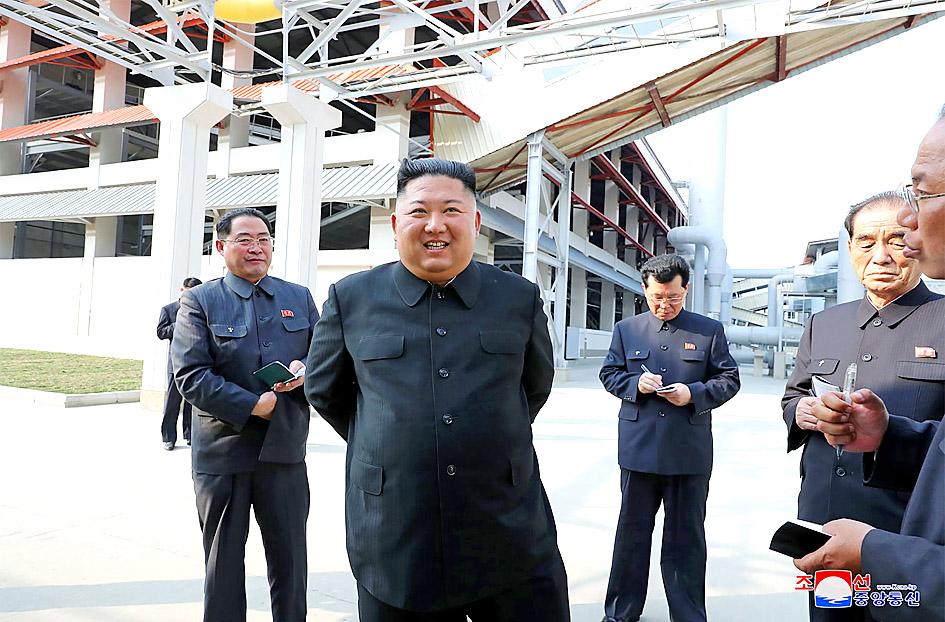When North Korea broke a three-week silence on leader Kim Jong-un’s public activity yesterday, it offered no clue as to where he had been during a period of intense global speculation about his health and whereabouts, or why he was hidden from the public for so long.
Instead, state media simply showed him surrounded by aides and appearing confident at a gleaming fertilizer factory that is believed by outside experts to be part of a secret nuclear weapons program.
While much remains a mystery about Kim’s condition, the abrupt re-emergence of the relaxed and smiling leader was an obvious choreography of key messages from the secretive government: Kim is the supreme leader in full control of a drive to improve the impoverished country’s food security and economy, amid tough international sanctions and the threat of the COVID-19 pandemic.

Photo: AFP
The official Rodong Sinmun yesterday devoted three of its six pages to touting Kim’s leadership, crediting him for what it called “prosperity and self-reliance.”
Reuters could not verify the accuracy of official accounts or the authenticity of pictures from the event.
The sprawling complex is the result of Kim’s vision to build a modern factory that would support agricultural production and make progress in automating its chemical industry, former North Korean premier Pak Pong-ju said at the ribbon-cutting ceremony where Kim reappeared.
Kim’s appearance at the Sunchon fertilizer plant, which official media said occurred on Friday, was an example of “field guidance” — a key part of Kim’s public persona, where he presides over a major industrial or social project event, or at military drills involving strategic weapons, such as ballistic missiles or tactical warfare.
His second public visit this year to the site 50km north of the capital, Pyongyang, included a sizeable audience of officials from the army, the ruling Workers’ Party of Korea and the local community. Many wore masks in an apparent precaution against the coronavirus.
“Agricultural production is a top priority, which has a direct impact on the lives of the people,” said Koh Yu-hwan, president of the Korea Institute for National Unification, a South Korean government think-tank.
Kim’s sudden return was “a strategy to be in the center of world news without resorting to nuclear or missile tests,” Koh said.
The phosphate fertilizer factory in Sunchon, under construction since June 2017, has received much attention from North Korea’s leaders.
International observers have said that the plant is part of the North’s clandestine pursuit of uranium extraction for use in nuclear weapons, as the mineral can be a byproduct of making phosphate fertilizer.
There is strong evidence the factory is involved in uranium extraction, said a report this month by the California-based James Martin Center for Nonproliferation Studies.

Taiwan is gearing up to celebrate the New Year at events across the country, headlined by the annual countdown and Taipei 101 fireworks display at midnight. Many of the events are to be livesteamed online. See below for lineups and links: Taipei Taipei’s New Year’s Party 2026 is to begin at 7pm and run until 1am, with the theme “Sailing to the Future.” South Korean girl group KARA is headlining the concert at Taipei City Hall Plaza, with additional performances by Amber An (安心亞), Nick Chou (周湯豪), hip-hop trio Nine One One (玖壹壹), Bii (畢書盡), girl group Genblue (幻藍小熊) and more. The festivities are to

Auckland rang in 2026 with a downtown fireworks display launched from New Zealand’s tallest structure, Sky Tower, making it the first major city to greet the new year at a celebration dampened by rain, while crowds in Taipei braved the elements to watch Taipei 101’s display. South Pacific countries are the first to bid farewell to 2025. Clocks struck midnight in Auckland, with a population of 1.7 million, 18 hours before the famous ball was to drop in New York’s Times Square. The five-minute display involved 3,500 fireworks launched from the 240m Sky Tower. Smaller community events were canceled across New Zealand’s

‘IRRESPONSIBLE’: Beijing’s constant disruption of the ‘status quo’ in the Taiwan Strait has damaged peace, stability and security in the Indo-Pacific region, MOFA said The Presidential Office yesterday condemned China’s launch of another military drill around Taiwan, saying such actions are a “unilateral provocation” that destabilizes regional peace and stability. China should immediately stop the irresponsible and provocative actions, Presidential Office spokeswoman Karen Kuo (郭雅慧) said, after the Chinese People’s Liberation Army (PLA) yesterday announced the start of a new round of joint exercises around Taiwan by the army, navy and air force, which it said were approaching “from different directions.” Code-named “Justice Mission 2025,” the exercises would be conducted in the Taiwan Strait and in areas north, southwest, southeast and east of Taiwan

‘SLICING METHOD’: In the event of a blockade, the China Coast Guard would intercept Taiwanese ships while its navy would seek to deter foreign intervention China’s military drills around Taiwan this week signaled potential strategies to cut the nation off from energy supplies and foreign military assistance, a US think tank report said. The Chinese People’s Liberation Army (PLA) conducted what it called “Justice Mission 2025” exercises from Monday to Tuesday in five maritime zones and airspace around Taiwan, calling them a warning to “Taiwanese independence” forces. In a report released on Wednesday, the Institute for the Study of War said the exercises effectively simulated blocking shipping routes to major port cities, including Kaohsiung, Keelung and Hualien. Taiwan would be highly vulnerable under such a blockade, because it